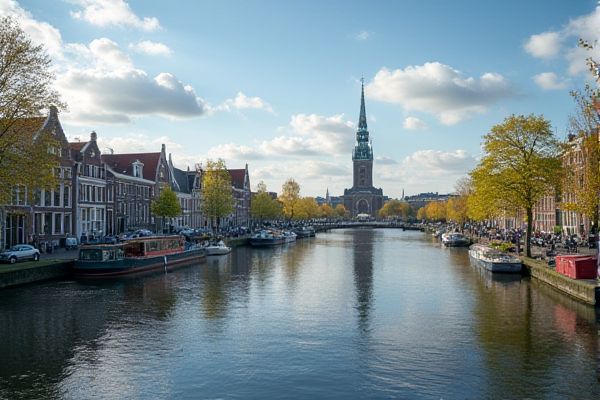
Education system and best schools in Netherlands: Dutch educational structure. Primary education age range. Secondary education pathways. International schools availability. IB curriculum options. Bilingual education programs. School enrollment process. Notable Dutch universities. Extracurricular activities importance. Dutch grading system.
Dutch educational structure.
The Dutch education system is characterized by eight years of primary education from age four to twelve, followed by highly diversified lower secondary education streams including VMBO (vocational), HAVO (preparing for universities of applied sciences), and VWO (preparing for research universities). Compulsory education runs from age five to eighteen, with various paths leading to higher education or vocational training. For more detailed information on the structure and specifics of the system, you can visit the Dutch Education System Overview.
Primary education age range.
Primary education in the Netherlands, known as *basisonderwijs*, spans eight years, from age 4 to 12, although compulsory education starts at age 5. Children typically begin in Groep 1 at age 4 and progress through to Groep 8 by age 12, gaining basic skills in reading, writing, and arithmetic. For more detailed insights into this system, you can explore the Dutch School System and its unique approach to foundational education.
Secondary education pathways.
In the Netherlands, secondary education is divided into several pathways: VMBO (Preparatory Secondary Vocational Education), HAVO (Senior General Secondary Education), and VWO (Pre-University Education). VMBO offers various tracks, including theoretical, mixed, middle management-oriented, and basic profession-oriented, which lead to MBO (Senior Secondary Vocational Education). Meanwhile, HAVO and VWO prepare students for further studies at HBO (Universities of Applied Sciences) and university (WO) respectively. For more detailed insight into these pathways, visit the Dutch Educational System page.
International schools availability.
The Netherlands boasts a considerable selection of international schools, totaling 152 educational institutions as of recent figures. Among these, a curated list highlights the top 20 schools that excel based on various user criteria. These institutions provide education in English and other international curricula, making them appealing choices for expatriate families and international students. For a detailed overview of the best options available, you can visit the Top International Schools in Netherlands database. The growing presence of such schools reflects the country's commitment to offering global education pathways that align with diverse international standards.
IB curriculum options.
The International Baccalaureate (IB) curriculum in the Netherlands focuses on student-oriented skills and competences, featuring subjects chosen from six groups, and mandatory components like Theory of Knowledge, Extended Essay, and Creativity, Activity, and Service (CAS), which emphasize critical thinking and social engagement. This globally recognized program fosters holistic development by promoting a balanced blend of academic rigor and real-world application, encouraging students to become well-rounded individuals. Through [international education](https://www.dutchinternationalschools.nl/what-dutch-schools-can-learn-from-international-education/), learners are equipped with the essential tools for personal and academic growth, preparing them for challenges beyond the classroom and instilling a lifelong passion for learning and civic responsibility.
Bilingual education programs.
In the Netherlands, bilingual education (TTO) was introduced in 1989, with around 122 secondary schools currently offering programs where subjects like Geography and Biology are taught in a foreign language, usually English. The European Platform monitors the quality of these schools, and programs like Winford Bilingual Schools offer fully immersive dual-language education in Dutch and English from primary to secondary levels. More information about such initiatives can be found on the National Education Systems website, where detailed insights into the structures and impacts of bilingual education are provided.
School enrollment process.
In the Netherlands, school enrollment begins with compulsory education at age 5, though most children start primary school at age 4. The enrollment process involves attending primary school for 8 years, followed by an attainment test in the final year of primary school, which advises on the appropriate secondary education stream based on the child's learning achievements and development. For more detailed insights, explore the National Education Systems to understand how these early stages form the foundation of educational pathways in the Netherlands.
Notable Dutch universities.
The Netherlands is renowned for its high-quality universities, with institutions like Delft University of Technology, UvA University of Amsterdam, Wageningen University & Research, and Erasmus University Rotterdam ranking highly in global university rankings. These universities offer a wide range of English-language Bachelor's and Master's programs, making the Netherlands a popular destination for international students.
Extracurricular activities importance.
In the Netherlands, extracurricular activities are highly valued and are often organized outside the school system. These activities include arts, music, sports, and community events, which are seen as essential for a child's development. They are particularly accessible in major cities with a high expat population. For more information on how these activities are integrated and their benefits, you can refer to the overview provided by the Access NL website.
Dutch grading system.
The Dutch Education System is known for not having a unified national grading system. However, schools in the Netherlands typically use a scale from 1 to 10, with 6 being the minimum passing grade. Grades are often accompanied by qualitative assessments and feedback, which are essential in supporting individual student development. For more detailed insights, you can visit the official website on the Dutch Education System.
